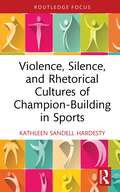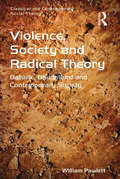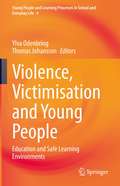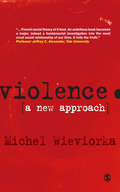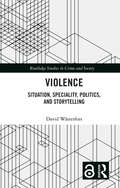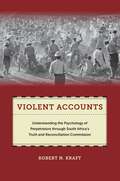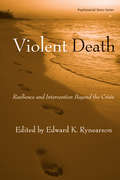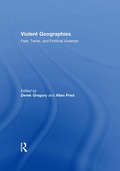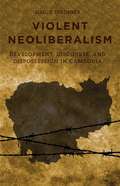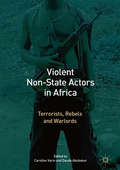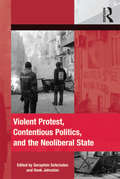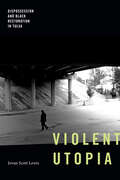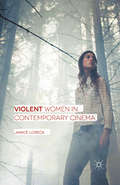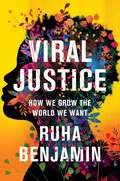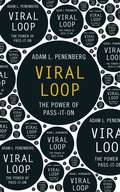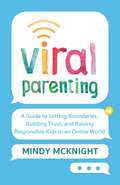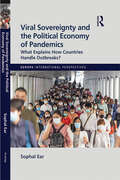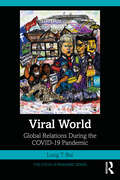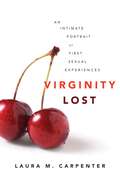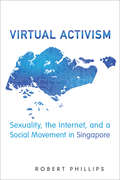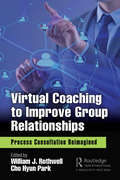- Table View
- List View
Violence, Silence, and Rhetorical Cultures of Champion-Building in Sports (Routledge Studies in Rhetoric and Communication)
by Kathleen Sandell HardestyThis book takes a close look at systems and rhetorics of silencing in sports training. Using the case study of the Larry Nassar abuse scandal at Michigan State University and within USA Gymnastics, the book explores multifaceted problems of speaking, silencing, and listening in youth and college athletic organizations, investigating the cultures of abuse and discursive practices that silence victims while protecting abusers. The author foregrounds the victims’ voices through an analysis of victim impact statements and victim interviews, while examining other textual artifacts to understand the institutional behaviors and actions both before and after the case caught public attention. Exploring the issue far beyond the single organization, the author discusses the norms, values, ideologies, and expected behaviors of youth and college sports programs as institutions to help describe “rhetorical cultures of champion-building.” This innovative study offers new perspectives that will interest students and scholars of sport communication, rhetoric, organizational communication, criminology, and feminist theory.
Violence, Society and Radical Theory: Bataille, Baudrillard and Contemporary Society (Classical and Contemporary Social Theory)
by William PawlettShedding light on the relationship between violence and contemporary society, this volume explores the distinctive but little-known theories of violence in the work of Georges Bataille and Jean Baudrillard, applying these to a range of violent events - events often labelled ’inexplicable’ - in order to show how even the most extreme of acts can be seen as socially meaningful. The book offers an understanding of violence as fundamental to social relations and social organisation, departing from studies that focus on individual offenders and their psychological states to concentrate instead on the symbolic relations or exchanges between agents and between agents and the structures they find themselves inhabiting. Developing the notion of symbolic economies of violence to emphasise the volatility and ambivalence of social exchanges, Violence, Society and Radical Theory reveals the importance to our understanding of violence, of the relationship between the structural or systemic violence of consumer capitalist society and forms of ’counter-violence’ which attack this system. A theoretically rich yet grounded expansion of that which can be considered meaningful or thinkable within sociological theory, this ground-breaking book will appeal to scholars and students of social and political theory and contemporary philosophy.
Violence, Victimisation and Young People: Education and Safe Learning Environments (Young People and Learning Processes in School and Everyday Life #4)
by Thomas Johansson Ylva OdenbringThis edited collection focuses on different aspects of everyday violence, harassment and threats in schools. It presents a number of in-depth studies of everyday life in schools and uses examples and case studies from different countries to fuel a discussion on national differences and similarities. The book discusses a broad range of concepts, findings and issues, under the umbrella of three main themes: 1) Power relations, homosociality and violence; 2) Sexualized violence and schooling; and 3) Everyday racism, segregation and schooling. Specific topics include sexuality policing, bullying, sexting, homophobia, and online rape culture. The school is young people’s central workplace, and therefore of great importance to students’ general feeling of wellbeing, safety and security. However, there is no place where youth are at greater risk of being exposed to harassment and violations than at school and on their way to and from school. Threats are a relatively common experience among school students, but some aspects of these mundane and frequent harassments and violations are not taken seriously and are, therefore, not reported. Harassment and violations often have negative effects on youth and children, and increase their risks of such adverse outcomes as school dropout, drug use, and criminal behaviour. Contemporary research has shown that gender is of great importance to how students handle and report, or do not report, various violent situations. Studies have also revealed how the notions of masculinity and of being a victim can be conflicting identities and affect how students handle situations of threat, violence and harassment. The importance of gender is also particularly evident with regard to sexual harassment. Female students generally report greater exposure to sexual harassment than male students do.
Violence: A New Approach
by Michel Wieviorka"Violence is sadly central to social life and yet oddly marginal to social theory. It's there in the background, not least as Weber defines the state by its monopoly of legitimate violence. But as the example suggests, it's the control of violence that looms large. Michel Wieviorka does a considerable service by calling our attention to violence itself, and to the theories like those of Sorel and Fanon who took it seriously. Wieviorka addresses the state, the media, and social movements. But perhaps his most important contributions come in examination of the ways in which violence informs and is informed by different dimensions of subjectivity. Thoughtfully intertwining classical theory and contemporary observation this is an engaging book, and one that should spark much new thought and research." - Craig Calhoun, London School of Economics and Political Science Violence is an ever-present phenomenon - obstinately resistant to interpretation. This text offers new tools to understand and analyze violence, presenting a new approach based on the subjectivity of the actor, and on the relation between violence and meaning. The first section discusses violence and conflict, violence and the state, and violence and the media. This provides critical context for developing a new paradigm - in the second section - that gives more importance to the concept of the subject than more classical paradigms. The text distinguishes different possible relations between the meaning of action and violence and proposes a new typology of the subjects involved in violence. It gives particular emphasis to discussing cruelty, violence for violence sake, and 'pure' violence. The relationship between conflict and violence; the place of victims, and the role of the media all shape new forms of violence. This text is an engaged response to these new forms that presents a convincing interpretation and new tools that will be essential for researchers in the social sciences.
Violence: Situation, Speciality, Politics and Storytelling (Routledge Studies in Crime and Society)
by David WästerforsThis book considers how the concept of violence has been interpreted, used, defined, and explored by social researchers and thinkers. It does not provide a final answer to the question of what violence is or how it should be explained (or prevented), and instead offers a variety of useful ways of thinking about and theorising the phenomenon, mainly from a sociological standpoint. It outlines four ways of understanding violence: • Violence as situation: the tension that exists between category-driven and situational explanations. • Violence as speciality: the study of particularly violent actors, and how they may be understood by reference to childhood histories, technologies, institutions, culture, class, and gender. • Violence as politics: political violence and violent politics. • Violence as storytelling: representations of violence from a narrative perspective. Concluding with reflections on possible convergences between the four approaches and new directions for research, this book offers a unique and experimental approach to discussing and reconstructing the concept of violence. It is essential reading for criminologists, sociologists, and philosophers alike.
Violent Accounts: Understanding the Psychology of Perpetrators through South Africa’s Truth and Reconciliation Commission (Qualitative Studies in Psychology #9)
by Robert N. KraftViolent Accounts presents a compelling study of how ordinary people commit extraordinary acts of violence and how perpetrators and victims manage in the aftermath. Grounded in extensive, qualitative analysis of perpetrator testimony, the volume reveals the individual experiences of perpetrators as well as general patterns of influence that lead to collective violence. Drawing on public testimony from the amnesty hearings of the South African Truth and Reconciliation Commission, the book interweaves hundreds of hours of testimony from seventy-four violent perpetrators in apartheid South Africa, including twelve major cases that involved direct interactions between victims and perpetrators. The analysis of perpetrator testimony covers all tiers on the hierarchy of organized violence, from executives who translated political doctrine into general strategies, to managers who translated these general strategies into specific plans, to the staff—the foot soldiers—who carried out the destructive plans of these managers. Vivid and accessible, Violent Accounts is a work of innovative scholarship that transcends the particulars of the Truth and Reconciliation Commission to reveal broader themes and unexpected insights about perpetrators of collective violence, the confrontations between victims and perpetrators in the aftermath of this violence, the reality of multiple truths, the complexities of reconciliation, and lessons of restorative justice.
Violent Death: Resilience and Intervention Beyond the Crisis (Psychosocial Stress Series)
by Edward K. RynearsonThis book pulls together a definitive collection of work on the theory and practice of clinical, spiritual, and emotional support after the experience of violent death - counseling beyond the crisis. Over the past decade, there have been countless publications devoted to crisis response, crisis intervention and counseling, disaster mental health services, and support for victims of traumatic events, but almost none devoted to the response planning and community care for those individuals who continue to struggle with trauma and grief issues for more than a few months after a violent death. The chapters in this volume, written by national and international experts in the field, provide the reader with the theoretical and clinical bases necessary for planning and implementing clinical and spiritual services to meet the needs of survivors, witnesses, family and community members of violent death.
Violent Femmes: Women as Spies in Popular Culture (Transformations)
by Rosie WhiteThe female spy has long exerted a strong grip on the popular imagination. With reference to popular fiction, film and television Violent Femmes examines the figure of the female spy as a nexus of contradictory ideas about femininity, power, sexuality and national identity. Fictional representations of women as spies have recurrently traced the dynamic of women’s changing roles in British and American culture. Employing the central trope of women who work as spies, Rosie White examines cultural shifts during the twentieth century regarding the role of women in the professional workplace. Violent Femmes examines the female spy as a figure in popular discourse which simultaneously conforms to cultural stereotypes and raises questions about women's roles in British and American culture, in terms of gender, sexuality and national identity. Immensely useful for a wide range of courses such as film and television studies, English, cultural studies, women’s studies, gender studies, media studies, communications and history, this book will appeal to students from undergraduate level upwards.
Violent Geographies: Fear, Terror, and Political Violence
by Derek Gregory Allan Pred"Violent Geographies is essential to understanding how the politics of fear, terror, and violence in being largely hidden geographically can only be exposed in like manner. The 'War on Terror' finally receives the coolly critical analysis its ritual invocation has long required." —John Agnew, Professor of Geography, UCLA "Urgent, passionate and deeply humane, Violent Geographies is uncomfortable but utterly compelling reading. An essential guide to a world splintered and wounded by fear and aggression—this is geography at its most politically engaged, historically sensitive, and intellectually brave." —Ben Highmore, University of Sussex "This is what a ‘public geography’ should be all about: acute analysis of momentous issues of our time in an accessible language. Gregory and Pred have assembled a peerless group of critical geographers whose essays alter conventional understandings of terror, violence, and fear. No mere gazetteer, Violent Geographies shows how place, space and landscape are central components of the real and imagined practices that constitute organised violence past and present. If you thought terror, violence, and fear were the professional preserve of security analysts and foreign affairs experts this book will force you to think again." —Noel Castree, School of Environment and Development, Manchester University "A studied, passionate and moving examination of the way in which the violent logics of the ‘War on Terror’ have so quickly shuttered and reorganized the spaces of this planet on its different scales. From the book emerges a critical new cartography that clearly charts an archipelago of a large multiplicity of ‘wild’ and ‘tamed’ places as well as ‘black holes’ within and between which we all struggle to live."—Eyal Weizman, Director, Goldsmiths College Centre for Research Architecture
Violent Neoliberalism
by Simon SpringerViolent Neoliberalism explores the complex unfolding relationship between neoliberalism and violence. Employing a series of theoretical dialogues on development, discourse and dispossession Cambodia, this study sheds significant empirical light on the vicious implications of free market ideology and practice.
Violent Non-State Actors in Africa
by Caroline Varin Dauda AbubakarThis book explores the rise and impact of violent non-state actors in contemporary Africa and the implications for the sovereignty and security of African states. Each chapter tackles a unique angle on violent organizations on the continent with the view of highlighting the conditions that lead to the rise and radicalization of these groups. The chapters further examine the ways in which governments have responded to the challenge and the national, regional and international strategies that they have adopted as a result. Chapter contributors to this volume examine the emergence of Islamist terrorists in Nigeria, Mali and Libya; rebels in DR Congo, Central African Republic, Ethiopia and Rwanda; and warlords and pirates in Somalia, Uganda and Sierra Leone.
Violent Protest, Contentious Politics, and the Neoliberal State (The Mobilization Series on Social Movements, Protest, and Culture)
by Hank Johnston Seraphim SeferiadesThis volume of cutting-edge research comparatively analyzes violent protest and rioting, furthering our understanding of this increasingly prevalent form of claim making. Hank Johnston and Seraphim Seferiades bring together internationally recognized experts in the field of protest studies and contentious politics to analyze the causes and trajectories of violence as a protest tactic. Crossnational comparisons from North America, Britain, France, Germany, Greece, Iran, Thailand, and elsewhere contribute to the volume's theoretical elaboration, while several case studies add depth to the discussion. This title will be of key importance to scholars across the social sciences, including sociology, political science, geography and criminology. Johnston and Seferiades's exciting book is a significant contribution to the study of rioting and violent protest in the contemporary neoliberal state.
Violent Utopia: Dispossession and Black Restoration in Tulsa
by Jovan Scott LewisIn Violent Utopia Jovan Scott Lewis retells the history and afterlife of the 1921 Tulsa race massacre, from the post-Reconstruction migration of Black people to Oklahoma Indian Territory to contemporary efforts to rebuild Black prosperity. He focuses on how the massacre in Tulsa’s Greenwood neighborhood—colloquially known as Black Wall Street—curtailed the freedom built there. Rather than framing the massacre as a one-off event, Lewis places it in a larger historical and social context of widespread patterns of anti-Black racism, segregation, and dispossession in Tulsa and beyond. He shows how the processes that led to the massacre, subsequent urban renewal, and intergenerational poverty shored up by nonprofits constitute a form of continuous slow violence. Now, in their attempts to redevelop resources for self-determination, Black Tulsans must reconcile a double inheritance: the massacre’s violence and the historical freedom and prosperity that Greenwood represented. Their future is tied to their geography, which is the foundation from which they will repair and fulfill Greenwood’s promise.
Violent Women in Contemporary Cinema
by Janice LoreckViolent women in cinema pose an exciting challenge to spectators, overturning ideas of 'typical' feminine subjectivity. This book explores the representation of homicidal women in contemporary art and independent cinema. Examining narrative, style and spectatorship, Loreck investigates the power of art cinema to depict transgressive femininity.
Violent Women in Contemporary Cinema
by Janice LoreckViolent women in cinema pose an exciting challenge to spectators, overturning ideas of 'typical' feminine subjectivity. This book explores the representation of homicidal women in contemporary art and independent cinema. Examining narrative, style and spectatorship, Loreck investigates the power of art cinema to depict transgressive femininity.
Violins: Local Meanings, Globalized Sounds (Routledge Series for Creative Teaching and Learning in Anthropology)
by Pamela A. MoroViolins: Local Meanings, Globalized Sounds examines the violin as an object of meaning in a variety of cultural and historical contexts, and as a vehicle for introducing anthropological issues. Each chapter highlights concepts as taught in lower-level anthropology courses, and includes teaching and learning tools. Chapters range from a memoir-like social biography of a single instrument to explorations of violins in relation to technology, labor, the environment, migration, globalization, childhood, cultural understandings of talent and virtuosity, and prestige.
Viral Justice: How We Grow the World We Want
by Ruha BenjaminFrom the author of Race After Technology, an inspiring vision of how we can build a more just world—one small change at a time“A true gift to our movements for justice.”—Michelle Alexander, author of The New Jim CrowLong before the pandemic, Ruha Benjamin was doing groundbreaking research on race, technology, and justice, focusing on big, structural changes. But the twin plagues of COVID-19 and anti-Black police violence inspired her to rethink the importance of small, individual actions. Part memoir, part manifesto, Viral Justice is a sweeping and deeply personal exploration of how we can transform society through the choices we make every day.Vividly recounting her personal experiences and those of her family, Benjamin shows how seemingly minor decisions and habits could spread virally and have exponentially positive effects. She recounts her father’s premature death, illuminating the devastating impact of the chronic stress of racism, but she also introduces us to community organizers who are fostering mutual aid and collective healing. Through her brother’s experience with the criminal justice system, we see the trauma caused by policing practices and mass imprisonment, but we also witness family members finding strength as they come together to demand justice for their loved ones. And while her own challenges as a young mother reveal the vast inequities of our healthcare system, Benjamin also describes how the support of doulas and midwives can keep Black mothers and babies alive and well.Born of a stubborn hopefulness, Viral Justice offers a passionate, inspiring, and practical vision of how small changes can add up to large ones, transforming our relationships and communities and helping us build a more just and joyful world.
Viral Loop: The Power Of Pass-it-on
by Adam PenenbergYou read a book, you recommend it to a friend. That friend tells another friend. And another... until the book becomes this year's word-of-mouth sensation. This is the first to analyze the power of the 'pass-it-on' phenomenon, introducing us to the architects of the mightily efficient, money-spinning model known as the Viral Loop - the secret behind some of the most successful businesses in recent history. Outfits such as Google, eBay, Flickr and Facebook all employ the model at their core; all have seen their stock valuations skyrocket within years of forming. The genius lies in the model's reliance on replication: what's the point of using Facebook if none of your friends can see your profile, or using Flickr if you can't share your photos? Where's the joy in posting a video on YouTube if no one watches it? In creating a viral product that people want, need and desire, growth can, and will, take care of itself. Find out why the Loop will catch us all up, sooner rather than later...
Viral Parenting: A Guide to Setting Boundaries, Building Trust, and Raising Responsible Kids in an Online World
by Mindy McKnightMindy McKnight, YouTube's favorite mom, shares the tools parents need to keep kids safe in their online lives--and shows how to create stronger family relationships as they do. A cross between Jen Hatmaker and Rosalind Wiseman, VIRAL PARENTING is a guide to raising responsible, safe, and communicative kids in the digital world. Mindy shares practical tools for having honest conversations with kids of all ages about privacy, bullying, respectfulness, and family time, while emphasizing the importance of trust and open communication. These strategies are timeless--whether applied to texting, snapping, Facebooking, kiking, or whatever social media platforms await us in the future, this book is ultimately about teaching children about personal responsibility and safety. Mindy shares practical tools for creating family rules for kids of all ages about privacy, bullying, respectfulness, and family time, while emphasizing the importance of trust and open communication. Using family contracts, guided conversations, device checks, and respectful but firm oversight, the McKnights have raised a close knit family and navigated the complexity of being world-wide internet celebrities with grace. McKnight will show any parent of any child or teen how that's done--setting non-negotiable guidelines and offering a savvy perspective toward privacy that audience have been begging for.
Viral Sovereignty and the Political Economy of Pandemics: What Explains How Countries Deal with Outbreaks? (Europa International Perspectives)
by Sophal EarOver the past few decades a number of emerging infectious diseases (EIDs) have disrupted societies throughout the world, including HIV, Ebola, H5N1 (or ‘‘avian flu’’) and SARS, and of course the coronavirus disease (COVID-19) which spread worldwide to become a global pandemic. As well as EIDs, countries and regions also contend with endemic diseases, such as malaria. There are many factors that have contributed to the rise in, and spread of, EIDs and other diseases, including overpopulation, rapid urbanization, environmental degradation, and antibiotic resistance. Political and cultural responses to disease can greatly affect their spread. The global community needs to defend itself against disease threats: one weak link is enough to start a chain reaction that results in a global pandemic such as COVID-19. Some states take a nationalistic approach towards combating disease; however, international cooperation and meaningful ‘‘viral sovereignty’’—empowering countries to create effective health institutions and surveillance systems in order to contain disease—must be considered. This volume, with a focus on Southeast Asia, Africa and North America, considers the intersection between disease, politics, science, and culture in the global battle against pandemics, making use of case studies and interviews to examine the ways in which governments and regions handle outbreaks and pandemics.
Viral World: Global Relations During the COVID-19 Pandemic (The COVID-19 Pandemic Series)
by Long T. BuiThis book argues that the catastrophe of COVID-19 provided a momentous time for groups, institutions, and states to reassess their worldviews and relationship to the entire world. Following multiple case studies across dozens of countries throughout the course of the pandemic, this book is a timely contribution to cultural knowledge about the pandemic and the viral politics at the heart of it. Mapping the various forms of global consciousness and connectivity engendered by the crisis, the book offers the framework of "viral worlding," defined as viral forms of relationality, becoming, and communication. It demonstrates how worlding or world-making processes accelerated with the novel coronavirus. New emergent forms of being global "went viral" to address conditions of inequality as well as forge possibilities for societal transformation. Considering the tumult wrought by the pandemic, Bui analyzes progressive movements for democracy, abolition, feminism, environmentalism, and socialism against the world-shattering forces of capitalism, authoritarianism, racism, and militarism. Focusing on ways the pandemic disproportionately impacted marginalized communities, particularly in the Global South, this book juxtaposes the closing of their lifeworlds and social worlds by hegemonic global actors with increased collective demands for freedom, mobility, and justice by vulnerable people. The breadth and depth of the book thus provides students, scholars, and general readers with critical insights to understanding the world(s) of COVID-19 and collective efforts to build better new ones.
Viren in allen Dimensionen: Wie ein Informationscode Viren, Software und Mikroorganismen steuert
by Rafael BallMikroorganismen, Viren und Computerprogramme codieren alle Informationen, die erforderlich sind, sich selbst zu vermehren und verbreiten. Dabei sind sich diese Mechanismen in der belebten Welt, in der Welt der Viren und sogar in der Welt der technischen Systeme verblüffend ähnlich. Das Buch zeigt auf, wie groß die Parallelen dieser verschiedenen belebten und unbelebten replizierenden Systeme sind und worauf sie basieren. Der Ausflug führt ebenso in die faszinierende Welt der Genetik, zur Frage, was Leben definiert und in die Programmierung von Software, die sich selbständig vervielfacht. Schließlich wird daraus die Frage abgeleitet, ob und inwieweit solche sich selbst replizierenden technischen Systeme genauso gefährlich werden können wie infektiöse Viren bei der Auslösung von Pandemien, wie etwa der Corona-Pandemie im Jahr 2020.
Virginity Lost: An Intimate Portrait of First Sexual Experiences
by Laura CarpenterAn intimate analysis of the first timeNervous, inexperienced, confused. For most, losing your virginity is one of life's most significant moments, always to be remembered. Of course, experiences vary, but Laura Carpenter asks: Is there an ideal way to lose it? What would constitute a “positive” experience? What often compels the big step? And, further, what does “going all the way” really mean for young gays and lesbians?In this first comprehensive study of virginity loss, Carpenter teases out the complexities of all things virgin by drawing on interviews with both young men and women who are straight, gay or bisexual. Virginity Lost offers a rare window into one of life's most intimate and significant sexual moments. The stories here are frank, poignant and fascinating as Carpenter presents an array of experiences that run the gamut from triumphant to devastating.Importantly, Carpenter argues that one's experience of virginity loss can have a powerful impact on one's later sexual experiences. Especially at a time of increased debate about sexual abstinence versus safe sex education in public schools, this important volume will provide essential information about the sex lives of young people.
Virtual Activism: Sexuality, the Internet, and a Social Movement in Singapore (Anthropological Horizons)
by Robert PhillipsIn Virtual Activism: Sexuality, the Internet, and a Social Movement in Singapore, cultural anthropologist Robert Phillips provides a detailed, yet accessible, ethnographic case study that looks at the changes in LGBT activism in Singapore in the period 1993-2019. Based on extensive fieldwork conducted with activist organizations and individuals, Phillips illustrates key theoretical ideas – including illiberal pragmatics and neoliberal homonormativity – that, in combination with the introduction of the Internet, have shaped the manner by which LGBT Singaporeans are framing and subsequently claiming rights. Phillips argues that the activism engaged in by LGBT Singaporeans for governmental and societal recognition is in many respects virtual. His analysis documents how the actions of activists have resulted in some noteworthy changes in the lives of LGBT Singaporeans, but nothing as grand as some would have hoped, thus indexing the "not quite" aspect of the virtual. Yet, Virtual Activism also demonstrates how these actions have encouraged LGBT Singaporeans to fight even harder for their rights, signalling the "possibilities" that the virtual holds.
Virtual Coaching to Improve Group Relationships: Process Consultation Reimagined
by William J. Rothwell and Cho Hyun ParkProcess consultation, invented by Edgar Schein, is both a skill and an organization development change effort. As a skill, process consultation means the ability to observe and provide feedback about small group dynamics to a work group about how well group members interact and how to improve that interaction. Just as facilitators devote their time to (in one word) asking, process consultants devote their time to (in one word) watching—at an expert level. As a change effort, process consultation is a concerted effort to help members of a group work together more effectively. For that reason, the word "process" in this context should be interpreted to mean "interpersonal interaction in small groups." Historically, process consultation has focused attention on face-to-face groups and their group dynamics. But times are changing. More work is done online or in blended (online and onsite) groups than face-to-face alone. A 2017 survey of over 25,000 workers in 12 countries revealed that 62% of global workers are now working flexibly—with some residential work and some virtual work. The same survey found that workers believe that flexible work arrangements make them more productive and that 48% of survey respondents reported that their virtual interactions include representatives of other cultures. It is true that, for workers who can discipline themselves and manage distractions at home, virtual work can be more productive when commuting time is eliminated and workplace distractions are minimized. Virtual work has the advantage of reducing the need for childcare, slashing work wardrobe costs, and cutting unproductive, stressful commuting time. Despite how modes of working together have changed over the years—ranging from face-to-face to some degree of virtual (video conference, audio conference, print-only collaboration, and many blended combinations)—and the growing need for finding ways to help people work together more effectively, there has been no practical guideline of process consultation in a virtual or mixed work setting since Schein’s process consultation initially focused on group dynamics in face-to-face settings. Therefore, this book aims to provide practical approaches to process consultation, helping group members discover more effective ways of working together in blended virtual/residential and cross-cultural settings. Essentially, this book provides a practical, how-to guide for virtual coaching, using step-by-step procedural approaches, cases, and helpful platforms/technologies and tools. It also provides information about how to use technology to support the process of improving virtual or mixed group relationship.
